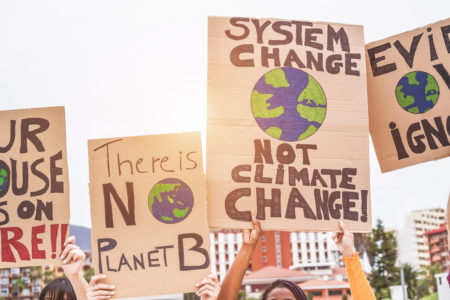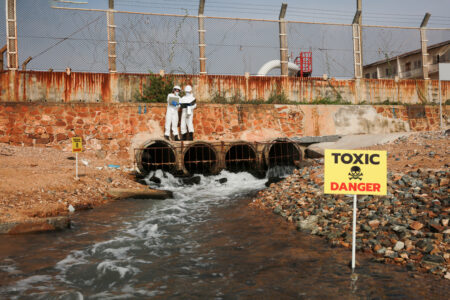Share On Social!
The COVID-19 pandemic isn’t the only catastrophe harming the health of Latinos and other communities of color.
Natural disasters—such as the massive snowstorm that rocked the Texas’ energy grid in February 2021 or Hurricane Harvey that decimated South Texas in 2017—can have long-lasting impacts.
These devastating weather events are directly linked to Climate Change, experts say.
Many of the world’s most successful corporations are among the worst contributors to global warming.
Worse, those corporations aren’t doing enough to help solve the issue, according to recent numbers from the international climate management group, whose report outlines the slow progress.
“The Climate Action 100+ Net Zero Company Benchmark shows there is an urgent need for greater corporate action and higher ambition in accelerating the net-zero economy and ensuring a safe and viable future,” said Mindy Lubber, CEO and President at sustainability organization Ceres, and a member of the Climate Action 100+ Steering Committee.
Slow Action on Climate Change Progress
Climate Action 100+ was first formed in 2017 to manage and work with companies to meet their goals of reaching benchmarks set up in the Paris Climate Accords.
Despite the years of work, the data shows that the world’s largest emitters—including companies like major oil companies such as Exxon, Saudi Aramco, BP and Unileve—haven’t made much progress in emitting less harmful substances into the atmosphere.
They also haven’t even disclosed their plans in reaching net-zero emissions by 2050, a critical goal that must be reached in order to stand a chance against the inevitable harm that will come of global warming, experts say.
Of the 159 companies that Climate Action 100+ oversees, of those who set net-zero targets: 
- 107 companies had set medium-term targets, but only 20 met all the assessment criteria
- 75 to set short-term targets, only eight met all the assessment criteria
- Only six companies had committed to aligning their capital expenditure with their long-term reduction targets
- No companies have so far pledged to align them with the Paris Agreement goal of limiting the global temperature rise to 1.5 degrees Celsius
“This is a vitally important piece of work. We will be using it not only to inform our engagement but also our proxy voting, because for us, ultimately, we have to be able to hold boards accountable,” said Anne Simpson, managing investment director of board governance and sustainability at the California Public Employees’ Retirement System (CalPERS).
This is no laughing matter, as these kinds of business failures impact people around the world every day. In America, it is Latinos and others who already face systemic injustice that will bear the brunt of climate change impacts.
Climate Change and Its Effects on Latinos
Overall, people of color fare worse due to the impacts of global warming.
This crisis will have significantly worse repercussions on underserved groups, including Latinos. These populations will not only have a harder time dealing with future consequences, but they are already enduring its current impacts.
The current COVID-19 pandemic has only worsen
ed these problems, according to Corazón Latino’s Monterroso.
“Latino voters see an opportunity to tackle two important problems facing their communities— climate change and unemployment,” he writes in a recent USA Today op-ed. “The Latino Decisions poll revealed that Latinos who have suffered job loss during the pandemic and make under $50,000 a year are more likely to support our government not only investing but prioritizing commonsense clean energy and green infrastructure solutions.”
The impacts of a warming globe are causing Latinos to realize the severity of this problem.
In 2017, Yale University’s Program on Climate Change Communication discovered that roughly three in four Latinos perceive global warming as a matter of immediate importance. But most Americans underestimate just how concerned Latinos and other minority groups are about environmental threats, according to a 2018 Cornell University study.
What Can I Do to Help?
Impactful legislation is the main options to make significant headway in this issue, experts say.
Still, there are ways that any person can make an impact.
One of those ways includes how you vote, according to Corazón Latino’s Monterroso.
“President Biden campaigned on the notion that the environment and economy are completely intertwined,” he writes in a recent USA Today op-ed. 64% of eligible Latinos voted in the 2020 presidential election. “This is one aspect of the incoming administration’s emerging priorities that resonates deeply with the Latino constituency, whether Republican or Democrat.”
Parents and residents also can help leaders make change by getting involved in neighborhood associations and local committees, boards, and commissions. These groups rely on your input to shape plans and policies that impact health and the environment in your area.
You can also find out

“City boards and commissions are … how our community navigates the daily and weekly decisions that make El Paso run smoothly and to become the kind of community we all want,” according to the City of El Paso.
You can share important environmental information with your local leaders, too — if you’d like to continue making a difference in your community’s sustainability practices, you can download a Salud America! Health Equity Report Card.
The report card will show you how you will see how your county is doing on a variety of health-related conditions compared to the rest of your state and nation. The data will show how your area stacks up in education, as well as housing, transportation, poverty, healthcare, mental health, environmental issues, and access to healthy food and active spaces.
Email your Health Equity Report Card to community leaders, share it on social media, and use it to make the case to address food insecurity where help is needed most!
Explore More:
Chemical & Toxic ExposureBy The Numbers
1
Quick Survey
Can help you find out how chemically sensitive you are



